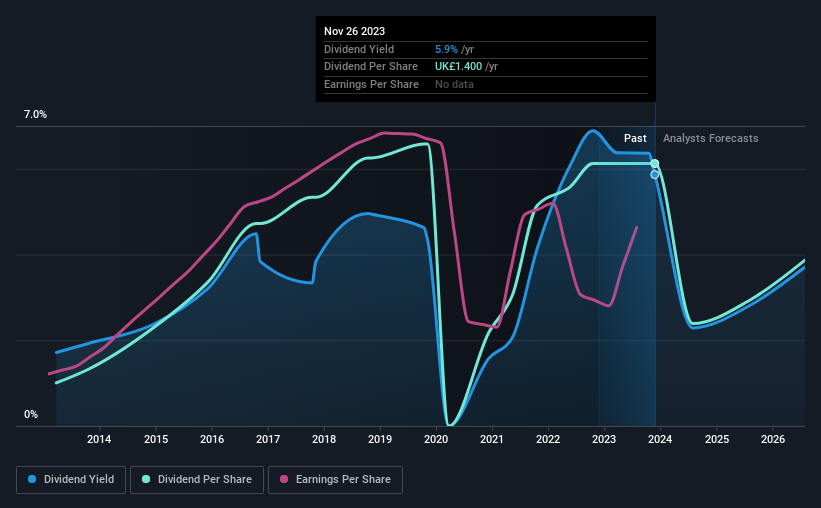Just Three Days Till Bellway p.l.c. (LON:BWY) Will Be Trading Ex-Dividend
Bellway p.l.c. (LON:BWY) stock is about to trade ex-dividend in three days. The ex-dividend date is one business day before the record date, which is the cut-off date for shareholders to be present on the company's books to be eligible for a dividend payment. The ex-dividend date is important because any transaction on a stock needs to have been settled before the record date in order to be eligible for a dividend. Accordingly, Bellway investors that purchase the stock on or after the 30th of November will not receive the dividend, which will be paid on the 10th of January.
The company's upcoming dividend is UK£0.95 a share, following on from the last 12 months, when the company distributed a total of UK£1.40 per share to shareholders. Based on the last year's worth of payments, Bellway has a trailing yield of 5.9% on the current stock price of £23.86. Dividends are an important source of income to many shareholders, but the health of the business is crucial to maintaining those dividends. That's why we should always check whether the dividend payments appear sustainable, and if the company is growing.
Check out our latest analysis for Bellway
Dividends are typically paid from company earnings. If a company pays more in dividends than it earned in profit, then the dividend could be unsustainable. Fortunately Bellway's payout ratio is modest, at just 47% of profit. That said, even highly profitable companies sometimes might not generate enough cash to pay the dividend, which is why we should always check if the dividend is covered by cash flow. It paid out more than half (74%) of its free cash flow in the past year, which is within an average range for most companies.
It's positive to see that Bellway's dividend is covered by both profits and cash flow, since this is generally a sign that the dividend is sustainable, and a lower payout ratio usually suggests a greater margin of safety before the dividend gets cut.
Click here to see the company's payout ratio, plus analyst estimates of its future dividends.
Have Earnings And Dividends Been Growing?
When earnings decline, dividend companies become much harder to analyse and own safely. If earnings decline and the company is forced to cut its dividend, investors could watch the value of their investment go up in smoke. With that in mind, we're discomforted by Bellway's 6.3% per annum decline in earnings in the past five years. When earnings per share fall, the maximum amount of dividends that can be paid also falls.
Another key way to measure a company's dividend prospects is by measuring its historical rate of dividend growth. Bellway has delivered 20% dividend growth per year on average over the past 10 years.
Final Takeaway
Should investors buy Bellway for the upcoming dividend? Its earnings per share have been declining meaningfully, although it is paying out less than half its income and more than half its cash flow as dividends. Neither payout ratio appears an immediate concern, but we're concerned about the earnings. In summary, while it has some positive characteristics, we're not inclined to race out and buy Bellway today.
If you're not too concerned about Bellway's ability to pay dividends, you should still be mindful of some of the other risks that this business faces. We've identified 2 warning signs with Bellway (at least 1 which can't be ignored), and understanding these should be part of your investment process.
A common investing mistake is buying the first interesting stock you see. Here you can find a full list of high-yield dividend stocks.
Have feedback on this article? Concerned about the content? Get in touch with us directly. Alternatively, email editorial-team (at) simplywallst.com.
This article by Simply Wall St is general in nature. We provide commentary based on historical data and analyst forecasts only using an unbiased methodology and our articles are not intended to be financial advice. It does not constitute a recommendation to buy or sell any stock, and does not take account of your objectives, or your financial situation. We aim to bring you long-term focused analysis driven by fundamental data. Note that our analysis may not factor in the latest price-sensitive company announcements or qualitative material. Simply Wall St has no position in any stocks mentioned.

